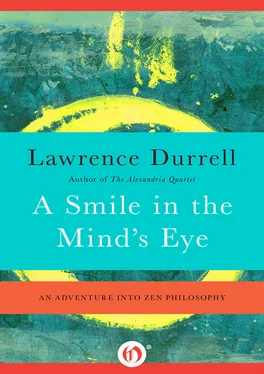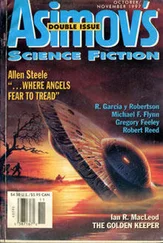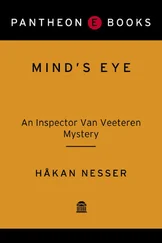It came, it seemed to me, as the result of the right kind of piety in love — piety which had nothing to do with a conventional religiosity. I had known it with one person — she had carried the tantric look with her, right into the midst of her death, like a standard. For a whole night the blue eyes continued to regard me with their impish felicity — the sapphire-blue regard with its privileged smile. In the whole of this fine transaction, I realized then there had been no place for self-gratification of a selfish kind. I was face to face with the blue flower of perfected knowledge. Only towards dawn the look became first sea-green, and then softly vitreous, it began to lose its pollen, to cloud over. I woke from those hours of riveted attention feeling profoundly informed by that serene tantric regard from the other side of death. To have been loved — I suddenly realized what a great compliment it was! Yet amusingly enough so often we had not been aware whether we had actually made love or not — so rapt had been the insight, so dense the communion of presence and touch. Yes, I knew what Chang’s text was getting at, though I wondered whether such notions would make any headway in an age such as ours, where such a spiritual state was as rare as the physical one was — orgasm without ejaculation! How could one put this over to monotheistic Christians who had been twisted by sanctimoniousness into the arthritic form of crucifixes? It had died with the last cathar, that look!
The quiddity of the Tao is in its quizzical stance. (The little god is called Coitus Absconditus !) My friend sat so perfectly still, watching me as I paced up and down, that I thought he had perhaps fallen asleep, ‘You are very hard on Christianity,’ he said at last, and I knew he was right. But it was all due to the mental jolt I received in my seventh or eighth year in Darjiling, where for a couple of years I had been placed in a Jesuit public school. It was a very good school and the good fathers were fine men — there was no propaganda. They preached by example only, and the example they gave was a high one. No, it was not they who gave me the shock. We Protestants numbered about forty children, and we were supposed to worship in town at the Church of England chapel. But one day while passing the Jesuit school chapel I found the door ajar and tiptoed inside, curious as children are. In the deep gloom I came upon a life-size figure of Christ crucified hanging over the altar, liberally blotched with blood and perfectly pig-sticked and thorn-hatted. An indescribable feeling of horror and fear welled up in me. So this was what those austerely garbed and bearded priests worshipped in this dense gloom among the flowers and candles! It was hardly a logical sequence of feelings and sentiments — it was quite spontaneous and unformulated. But the horror remained with me always; and later on, when my father decreed that I must go to England for my education, I felt that he was delivering me into the hands of these sadists and cannibals, men who could worship this brutal and savage effigy on the Christian cross. Naturally I could not put all this into words for many a year, but at that precise moment I knew that henceforward I would never bring myself to trust anyone who called himself a Christian and so invoke this doom-laden symbol of unhappiness! How right I was! So far nothing has ever come my way which might persuade me to modify this somewhat decisive though perhaps absurd view. 3The main road which passed the school in Darjiling ran along the side of the playing-fields; the sight of Tibetan lamas setting off on their long pilgrimages to the distant plains of India was a familiar one. Smiling, as if sauntering through the pages of Kim , they whirled their small prayer-wheels. I have had them on my mind ever since and can still hear the noise of the little brass wheels as they whirred out their prayers. But I had to make a wide detour to rediscover them, the lamas! A lion, I was thrown to the Christians!
* * *
So page by page, the text opened itself to our study, while the arguments and explanations spread out sideways from it, like crabs. Chang was delighted to hear that even old Rabelais had devoted thought to the matter of longevity, wondering if one could not ‘try how long an ingenious and agreeable man might last, if taken good care of’. Presumably the same sort of formula would apply — breathing, diet, husbanding of sexuality. Chang’s Taoist answers must have seemed on the face of it somewhat extravagant; yet here in the book were texts and pronouncements by the old masters of this love-craft which suggested quite the contrary. I was cutting up leeks as these ideas came under scrutiny and inadvertently threw out large sections of the outer leaves as I prepared them. Horrified, Chang gave a sort of little chirp — a Chinese sob — and dived down to the dustbin to recover them crying angrily: ‘You are wasting again; and you know how firm my Taoist principles are!’ There was heartbreak in his voice and I felt chastened and sorry. He took the discarded leaves and smoothed them delicately out with his fingers — as if they might have had a precious message graven on them. He washed them. ‘They are too coarse and old, Jolan,’ I remonstrated, but he shook his head and pursed his lips. He rolled them as one would a big tobacco leaf and taking the sharpest of the knives he cut them as finely as possible. He repeated for the hundredth time, ‘Anything is eatable if cut up small enough!’ I was proud of one thing however: to have reconverted him to ginger — it was a long time since he had used any in his cooking; also curry, I had some fresh curry from Madras — fresh from the armpits of Krishna, so to speak. He was less charitable to the wines in the house, and would not touch coffee. But he watched me indulgently as I drank, and toasting him I said, ‘I am suffering from a case of repressed longevity.’ But he only smiled and shook his head sadly, saying: ‘You are drinking too much; it makes you reason falsely and disturbs your yoga balance — not to mention making you fat …’ He was right, of course, but then the Good God gave us reason to make fools of ourselves with, and I did not want to be left behind. In a certain subterranean way this talk of the Tao — of the prelapsarian déclic which would enable one to turn the key of immortality in the lock — chimed in my mind with some old ideas I had had once about the nature of the poetic act. I felt that it was as if one were making the orgasm more and more conscious with each poem, exhausting, so to speak, the simple amnesia provoked by the ejaculation per se. Perhaps, without knowing it, I had been very close to the heart of the Tao of sex, as preached by my friend here, who was now sitting at the kitchen table looking at me in rather a curious way. He wore a look of devoted concentration on his face. Then I saw with surprise that there was a glass of wine before him. ‘I am going to drink with you,’ he said, ‘just to see what you see in it, if anything.’ Knowing his principles, and the highly strung and delicate state of health he enjoyed from the exercise of such radical precautions against gluttony, I did not believe him at first. I drank off a swig. He at once followed suit. I drank another. So did he. He made an awful face as he did so, but he seemed quite determined to commit suicide in this nauseating way — was it to register a reproach or a warning? I said nothing but went on talking of the pre-Adamic structure of the psyche and other matters, of the same sort, drinking all the while. He was imitating me. When I replenished my glass he held his out for a refill. ‘Come off it,’ I said, ‘I know it’s bad for you. Are you just trying to shame me?’ He shook his head and answered, ‘No, I am just trying something on you.’ I took a swig; he took a swig. In this way we finished dinner together drinking glass for glass. Of course it was an unequal struggle for I was in training while he, poor Taoist … He began to get unsteady and giggly; he found my jokes inordinately funny. I began to wonder if I should have to carry him up to bed. I felt that it was about time that the West made some cultural contribution to the Taoist scene, so I gave the Great Vampire Chortle — the sound with which I greet every unforeseen adversity in life. ‘What an extraordinary sound,’ he said. ‘What does it do?’ I answered. ‘It clears the air and clears the head; I have adapted it from Greek and Tibetan sources. Those who learn the Great Chortle are saved. Try it.’ He poised himself as if about to jump over a precipice and produced a very tolerable imitation of my chortle. Together we practised it a bit while we drank, until the plaster began to come off the ceiling. It was lucky that the morose existentialist gardener did not choose that moment to peer in from the balcony …
Читать дальше











